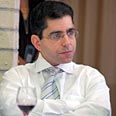
Guy Bechor
צילום: ניב קלדרון
Hizbullah’s capitulation
Despite ‘Hizbullah veto power’ claims, it only has one government minister
Recently we’ve been hearing the claim, here in Israel, that Hizbullah joined the new government in Beirut in order to take over one third of ministerial posts, thus acquiring “veto power” over all government decisions en route to taking over the government and the country.
This argument had truth to it before Hizbullah’s failed attempt to take over Sunni and Druze areas about two months ago. Following this attempt, the organization has been perceived as utilizing the “resistance” to Israel against its own people, and its stocks promptly plummeted.
This is the main reason why Hizbullah was highly interested in the prisoner swap with Israel: In order to restore its status on the Lebanese street.
As a result of the Beirut events, Hizbullah lost the legitimacy to dictate the Lebanese political discourse. It was left with no choice, and for the first time in its history the organization will bear some of the burden of government, but from an inferior position.
Nasrallah was forced to accept his archrival Fouad Siniora as prime minister. He will now send his people to cooperate with Siniora within the government. This is important, as Hizbullah was not a party to the Taif Agreement that ended the civil war in 1989, yet this time it will enter the government as a partner.
Hizbullah was forced to accept what Siniora gave it – three ministers out of 30; a total of 10%. Yet the Lebanese resistance to Hizbullah is so great even within the Shiite sect that in a goodwill gesture the organization announced that it is giving up two ministers. And so, the new Siniora government formed this week will see Hizbullah, the one with the “veto power,” the one that “seeks to take over Lebanon,” getting one minister only: Labor Minister Muhammad Fneish.
And who did Hizbullah hand over its two other remaining seats to? One was given to the representative of the Syrian regime in Lebanon, and the second was given to a Druze, Hizbullah rival Walid Jumblatt. Last week, Hizbullah gave the Druze sect another gift: Samir Kuntar, who is a Druze himself.
We can rightly say that Hizbullah has allies within the government, yet the picture here is complex. Most of Hizbullah’s partners happen to be Christian, mostly Maronites, who sought a way to return to political life after the blow they were dealt in the Taif Agreement. Nasrallah’s ally, Maronite Michel Aoun, is nicely represented in the new government, yet it would suffice to note that until his return to Lebanon he was one of Israel’s greatest friends in the country.
The Siniora government marks a return to Lebanese normalcy, and it is a masterful work of cautious sectarian representation. The Christians constitute precisely 50% of it (15 ministers out of 30) and the rest are Muslim (in Lebanon, the Druze are counted as part of the Muslim population.) This is the Taif Agreement’s format; half-half. This means the Christians are over-represented, while the Shiites are greatly under-represented. Yet Hizbullah agreed to that.
And what about Hizbullah’s presence in south Lebanon, south of the Litani River? The IDF claims that the organization smuggles weapons to the area. The latest UNIFIL report vehemently denies it. It is reasonable to accept UNIFIL’s claim actually, as Hizbullah has strictly maintained the rules that materialized south of the Litani.
Hizbullah has welcomed the control of the Lebanese army and its 15,000 troops in the area. This is convenient for it. Hizbullah also welcomes the presence of 13,000 UNIFIL troops in the area. Moreover, the Lebanese army is becoming stronger south of the Litani, an area it has not held since 1969, and in recent days it has been building bases and fortifications in the section of Shebaa Farms region that is inside Lebanon.
The situation in south Lebanon at this time is stable and does not look threatening. Overall, the latest developments in Lebanon are positive for Israel.










